
Louis Daniel Armstrong, nicknamed "Satchmo", "Satch", and "Pops", was an American trumpeter and vocalist who is among the most influential figures in jazz. His career spanned five decades and different eras in the history of jazz.
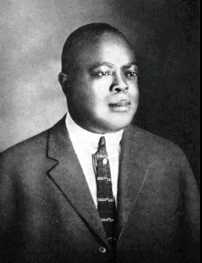
Joseph Nathan "King" Oliver was an American jazz cornet player and bandleader. He was particularly recognized for his playing style and his pioneering use of mutes in jazz. Also a notable composer, he wrote many tunes still played today, including "Dippermouth Blues", "Sweet Like This", "Canal Street Blues", and "Doctor Jazz". He was the mentor and teacher of Louis Armstrong. His influence was such that Armstrong claimed, "if it had not been for Joe Oliver, Jazz would not be what it is today."

In vocal jazz, scat singing is vocal improvisation with wordless vocables, nonsense syllables or without words at all. In scat singing, the singer improvises melodies and rhythms using the voice as an instrument rather than a speaking medium.
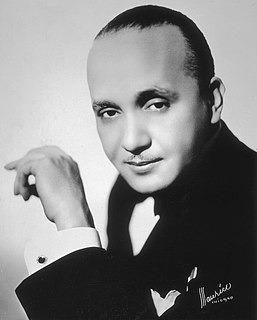
James Fletcher Hamilton Henderson was an American pianist, bandleader, arranger and composer, important in the development of big band jazz and swing music. He was one of the most prolific black musical arrangers and, along with Duke Ellington, is considered one of the most influential arrangers and bandleaders in jazz history. Henderson's influence was vast. He helped bridge the gap between the Dixieland and the swing eras. He was often known as "Smack" Henderson.

Henry James "Red" Allen was an American jazz trumpeter and vocalist whose style has been claimed to be the first to fully incorporate the innovations of Louis Armstrong.
The Hot Five was Louis Armstrong's first jazz recording band led under his own name.
"West End Blues" is a multi-strain twelve-bar blues composition by Joe "King" Oliver. It is most commonly performed as an instrumental, although it has lyrics added by Clarence Williams.

Porgy and Bess is a studio album by jazz vocalist and trumpeter Louis Armstrong and singer Ella Fitzgerald, released on Verve Records in 1959. The third and final of the pair's albums for the label, it is a suite of selections from the George Gershwin opera Porgy and Bess. Orchestral arrangements are by Russell Garcia, who had previously arranged the 1956 jazz vocal recording The Complete Porgy and Bess.

Ella and Louis Again is a studio album by Ella Fitzgerald and Louis Armstrong, released in 1957 on Verve Records. It is the sequel to their 1956 album, Ella and Louis. In contrast to their previous collaboration, this album features seven solo vocal tracks by either Armstrong or Fitzgerald amongst its dozen duet tracks. It was reissued as part of a two-compact disc set in 1995, and in The Complete Ella Fitzgerald & Louis Armstrong on Verve in 1997. It was recorded at Capitol Studios.

Ella and Louis is a studio album by Ella Fitzgerald and Louis Armstrong, accompanied by the Oscar Peterson Quartet, released in October 1956. Having previously collaborated in the late 1940s for the Decca label, this was the first of three albums that Fitzgerald and Armstrong were to record together for Verve Records, later followed by 1957's Ella and Louis Again and 1959's Porgy and Bess.

The Complete Ella Fitzgerald & Louis Armstrong on Verve is a compilation album released on Verve Records in 1997. It comprises three compact discs containing the three studio albums made for the label by Ella Fitzgerald and Louis Armstrong, released during 1956 through 1958.
"Ain't Misbehavin'" is a 1929 stride jazz/early swing song. Andy Razaf wrote the lyrics to a score by Thomas "Fats" Waller and Harry Brooks for the Broadway musical comedy play Connie's Hot Chocolates.

Louis Armstrong Plays W. C. Handy is a 1954 studio release by Louis Armstrong and His All Stars, described by Allmusic as "Louis Armstrong's finest record of the 1950s" and "essential music for all serious jazz collections". Columbia CD released the album on CD in 1986 in a much altered form, with alternative versions in place of many of the original songs, but restored the original with its 1997 re-issue, which also included additional tracks: a brief interview by the producer, George Avakian, with W. C. Handy; a joke told by Louis Armstrong; and several rehearsal versions of the songs.
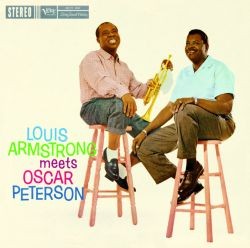
Louis Armstrong Meets Oscar Peterson is a 1957 studio album by Louis Armstrong, accompanied by Oscar Peterson.
"When It's Sleepy Time Down South", also known as "Sleepy Time Down South", is a 1931 jazz song written by Clarence Muse, Leon René and Otis René. It was sung in the 1931 movie Safe in Hell by Nina Mae McKinney, and became the signature song of Louis Armstrong, who recorded it almost a hundred times during his career. The song is now considered a jazz standard and it has been recorded by a plethora of artists. A popular recording in 1931 was by Paul Whiteman and his Orchestra.
The Louis Armstrong Hot Five and Hot Seven Sessions were recorded between 1925 and 1928 by Louis Armstrong with his Hot Five and Hot Seven groups. According to the National Recording Registry, "Louis Armstrong was jazz's first great soloist and is among American music's most important and influential figures. These sessions, his solos in particular, set a standard musicians still strive to equal in their beauty and innovation." These recordings were added to the National Recording Registry in 2002, the first year of the institution's existence.

Hot Fives & Sevens is a 2000 box set collection of recordings made by American jazz trumpeter and singer Louis Armstrong with his Hot Five, Hot Seven, and other groups between 1925 and 1930. First released on JSP Records on 22 August 2000, the set was subsequently reissued on Definitive in 2001. A four-disc compilation, the set has received a "crown" as an author's pick in The Penguin Guide to Jazz and is also included in the book's "core collection" recommended for jazz fans. Allmusic concurs that it is "beyond indispensable", suggesting that "you can't have a Louis Armstrong collection without this historic set" or "any kind of respectable jazz collection" Alternatively, Ben Ratliff, writing in 2002, preferred Columbia's release The Complete Hot Five and Hot Seven Recordings.

The Smithsonian Collection of Classic Jazz is a six-LP box set released in 1973 by the Smithsonian Institution. Compiled by jazz critic, scholar, and historian Martin Williams, the album included tracks from over a dozen record labels spanning several decades and genres of American jazz, from ragtime and big band to post-bop and free jazz.
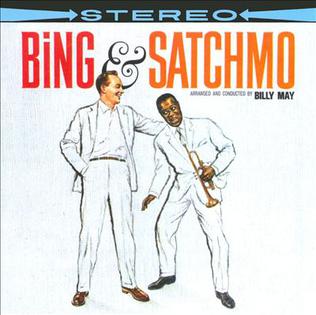
Bing & Satchmo is a 1960 studio album by Bing Crosby and Louis Armstrong that was arranged and conducted by Billy May. The album was recorded for Crosby's label, Project Records, and released by MGM.
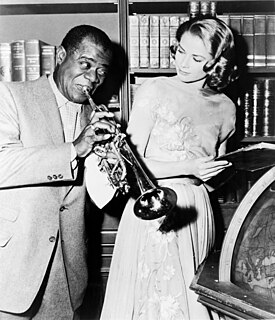
The collaborations between Ella Fitzgerald and Louis Armstrong have attracted much attention over the years. The artists were both widely known icons not just in the areas of big band, jazz, and swing music but across 20th century popular music in general. The two African-American musicians produced three official releases together in Ella and Louis (1956), Ella and Louis Again (1957), and Porgy and Bess (1959). Each release earned both commercial and critical success. As well, tracks related to those albums have also appeared in various forms in multi-artist collections and other such records.















